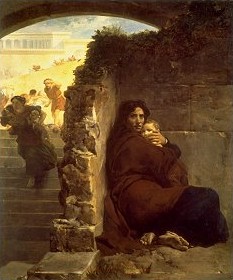The power to follow the vision
Alyosha Karamazov experienced the deepest trial of his faith at the loss of his dear starets, the elder Zossima, whom he loved more than life. Zossima was so holy and so esteemed that Alyosha just knew a great miracle would occur after his death: surely the body of Zossima would remain incorruptible, like great saints of the past! Surely great miracles of healing and renewal would flow from this broken body! But alas, dear Zossima died and the miracles did not come. Zossima decayed, and many of the lesser monks mocked openly – in life they envied Zossima; in death they took false pleasure. Alyosha was crushed beyond imagination. He was numb, and in this low state temptation comes. Ratikan, a sell-out monk, leads Alyosha to Grushenka, the beautiful, fallen and so-seductive Greshenka. The plan is to ruin his virtue in the hour of his greatest trial. But God uses the temptation in a remarkable way: instead of falling to seduction, Alyosha endures the temptation and enobles Grushenka. He treats her as a child of God, a sister in Christ. Renewed, he goes back to the monastery where he takes up the death watch by the man whom he loved. As he takes his place of loyal grief, something strange happens. The brothers began to read from the gospels, of the wedding at Cana of Galilee – of all Scriptures! And then, mysteriously, mystically, Alyosha finds his miracle! I won’t ruin the miracle for you…I’ll let you read it for yourself. But it is beyond profound. I relay it here, for all who have experienced the deep night of the soul; for all who have experienced temptation, the deep trial of faith, yet have returned to their post of duty; for all who have been touched by the calling; for all who have seen the great vault of heaven open in the Spirit, and been unashamed of its ecstasy; for all who have seen the Milky Way run like two great streams in the night sky, dancing before God from zenith to horizon, and have kissed the morning dew upon the grass, reborn after great trial, and sent out into the world to follow the call as a stranger and pilgrim, sharing the new hope of Christ as the power of His vision passes into your soul…this story is for you! May you be renewed in the reading!
IT WAS VERY LATE, according to monastery order, when Alyosha returned to the hermitage; the door keeper let him in by a special entrance. It had struck nine o’clock—the hour of rest and repose after a day of such agitation for all. Alyosha timidly opened the door and went into the elder’s cell where his coffin was now standing. There was no one in the cell but Father Païssy, reading the Gospel in solitude over the coffin, and the young novice Porfiry, exhausted by the previous night’s conversation and the disturbing incidents of the day, was sleeping the deep, sound sleep of youth on the floor of the other room. Though Father Païssy heard Alyosha come in, he did not even look in his direction. Alyosha turned to the right from the door to the corner, fell on his knees, and began to pray.
His soul was overflowing but with mingled feelings; no single sensation stood out distinctly; on the contrary, one drove out another in a slow, continual rotation. But there was a sweetness in his heart and, strange to say, Alyosha was not surprised at it. Again he saw that coffin before him, the hidden, dead figure so precious to him, but the weeping and poignant grief of the morning was no longer aching in his soul. As soon as he came in, he fell down before the coffin as before a holy shrine; but joy, joy, was glowing in his mind and in his heart. The one window of the cell was open, the air was fresh and cool. “So the smell must have become stronger, if they opened the window,” thought Alyosha. But even this thought of the smell of corruption, which had seemed to him so awful and humiliating a few hours before, no longer made him feel miserable or indignant. He began praying quietly, but he soon felt that he was praying almost mechanically. Fragments of thought floated through his soul, flashed like stars, and went out again at once, to be succeeded by others. Yet there was reigning in his soul a sense of the wholeness of things—something steadfast and comforting—and he was aware of it himself. Sometimes he began praying ardently; he longed to pour out his thankfulness and love…
But when he had begun to pray, he passed suddenly to something else and sank into thought, forgetting both the prayer and what had interrupted it. He began listening to what Father Païssy was reading, but worn out with exhaustion he gradually began to doze.
“And the third day there was a marriage in Cana of Galilee;” read Father Païssy. “And the mother of Jesus was there; and both Jesus was called, and his disciples, to the marriage."
“Marriage? What’s that…A marriage!” floated whirling through Alyosha’s mind. “There is happiness for her, too…She has gone to the feast…No, she has not taken the knife…That was only a tragic phrase…Well tragic phrases should be forgiven, they must be. Tragic phrases comfort the heart…without them, sorrow would be too heavy for men to bear. Rakitin has gone off to the back-alley. As long as Rakitin broods over his wrongs, he will always go off to the back-alley…But the high road…the road is wide and straight and bright as crystal, and the sun is at the end of it…Oh, what’s being read?…”
‘‘And when they wanted wine, the mother of Jesus saith unto him, ‘They have no wine’…” Alyosha heard.
“Ah, yes, I was missing that, and I didn’t want to miss it, I love that passage; it’s Cana of Galilee, the first miracle…Ah, that miracle! Ah, that sweet miracle! It was not men’s grief but their joy Christ visited; He worked His first miracle to help men’s gladness…‘He who loves men loves their gladness, too…’ he was always repeating that, it was one of his leading ideas…‘There’s no living without joy,’ Mitya says…Yes, Mitya…‘Everything that is true and good is always full of forgiveness,’ he used to say that, too…”
“Jesus saith unto her, Woman, what has it to do with thee or me? Mine hour is not yet come.
“His mother saith unto the servants: Whatsoever he saith unto you, do it…”
“Do it…Gladness, the gladness of some poor, very poor, people…Of course they were poor, since they hadn’t wine enough even at a wedding…The historians write that in those days the people living about the Lake of Gennesaret were the poorest that can possibly be imagined…and another great heart, that other great being, His mother, knew that He had come not only to make His great terrible sacrifice. She knew that His heart was open even to the simple, artless merrymaking of some obscure and unlearned people, who had warmly bidden Him to their poor wedding. ‘Mine hour is not yet come,’ He said, with a soft smile. (He must have smiled gently to her.) And indeed was it to make wine abundant at poor weddings He had come down to earth? And yet He went and did as she asked Him…Ah, he is reading again…”
“Jesus saith unto them, Fill the waterpots with water. And they filled them up to the brim.
“And he saith unto them, Draw out now and bear unto the governor of the feast. And they bare it.
“When the ruler of the feast had tasted the water that was made wine and knew not whence it was (but the servants which drew the water knew), the governor of the feast called the bridegroom,
“And saith unto him: Every man at the beginning doth set forth good wine; and when men have well drunk, that which is worse; but thou hast kept the good wine until now.”
“But what’s this, what’s this? Why is the room growing wider?…Ah, yes…It’s the marriage, the wedding…yes, of course. Here are the guests, here is the young couple sitting, and the merry crowd and…Where is the wise governor of the feast? But who is this? Who? Again the walls are receding…Who is getting up there from the great table? What!…He here, too? But he’s in the coffin…but he’s here, too. He has stood up, he sees me, he is coming here…Oh, God!”
Yes, he went up to him—to him—he, the little, thin old man, with tiny wrinkles on his face, joyful and laughing softly. There was no coffin now, and he was in the same dress as he had worn yesterday sitting with them, when the visitors had gathered about him. His face was uncovered, his eyes were shining. How was this then, he too had been called to the feast. He too at the marriage of Cana in Galilee…
“Yes, my dear, I am called too, called and bidden,” he heard a soft voice saying over him. “Why have you hidden yourself here, out of sight? You come and join us too.”
It was his voice, the voice of Father Zossima. And it must be he, since he called him!
The elder raised Alyosha by the hand, and he rose from his knees.
“We are rejoicing,” the little, thin old man went on. “We are drinking the new wine, the wine of new, great gladness; do you see how many guests? Here are the bride and bridegroom, here is the wise governor of the feast, he is tasting the new wine. Why do you wonder at me? I gave an onion to a beggar, so I too am here. And many here have given only an onion each—only one little onion…What are all our deeds? And you, my gentle one, you, my kind boy, you too have known how to give a famished woman an onion today. Begin your work, dear one, begin it, gentle one!…Do you see our Sun, do you see Him?”
“I am afraid…I dare not look,” whispered Alyosha.
“Do not fear Him. He is terrible in His greatness, awful in His sublimity, but infinitely merciful. He has made Himself like unto us from love and rejoices with us. He is changing the water into wine so that the gladness of the guests may not be cut short. He is expecting new guests; He is calling new ones unceasingly forever and ever…There they are bringing new wine. Do you see they are bringing the vessels…”
Something glowed in Alyosha’s heart, something filled it till it ached, tears of rapture rose from his soul…He stretched out his hands, uttered a cry and awoke.
Again the coffin, the open window, and the soft, solemn, distinct reading of the Gospel. But Alyosha did not listen to the reading. It was strange, he had fallen asleep on his knees, but now he was on his feet, and suddenly, as though thrown forward, with three firm rapid steps he went right up to the coffin. His shoulder brushed against Father Païssy without his noticing it. Father Païssy raised his eyes for an instant from his book, but looked away again at once, seeing that something strange was happening to the boy. Alyosha gazed for half a minute at the coffin, at the covered, motionless dead man that lay in the coffin, with the ikon on his breast and the peaked cap with the octangular cross on his head. He had only just been hearing his voice, and that voice was still ringing in his ears. He was listening, still expecting other words, but suddenly he turned sharply and went out of the cell.
He did not stop on the steps either, but went quickly down; his soul, overflowing with rapture, yearned for freedom, space, openness. The vault of heaven, full of soft, shining stars, stretched vast and fathomless above him. The Milky Way ran in two pale streams from the zenith to the horizon. The fresh, motionless, still night enfolded the earth. The white towers and golden domes of the cathedral gleamed out against the sapphire sky. The gorgeous autumn flowers in the beds round the house were slumbering till morning. The silence of earth seemed to melt into the silence of the heavens. The mystery of earth was one with the mystery of the stars.
Alyosha stood, gazed, and suddenly threw himself down on the earth. He did not know why he embraced it. He could not have told why he longed so irresistibly to kiss it, to kiss it all. But he kissed it weeping, sobbing, and watering it with his tears and vowed passionately to love it, to love it forever and ever. “Water the earth with the tears of your joy and love those tears,’’ echoed in his soul.
What was he weeping over?
Oh! in his rapture he was weeping even over those stars, which were shining at him from the abyss of space, and “he was not ashamed of that ecstasy.” There seemed to be threads from all those innumerable worlds of God, linking his soul to them, and it was trembling all over “in contact with other worlds.” He longed to forgive everyone for everything, and to beg forgiveness—oh not for himself but for all men, for all and for everything. “And others are praying for me too,” echoed again in his soul. But with every instant he felt clearly and, as it were, tangibly, that something firm and unshakable as that vault of heaven had entered into his soul. It was as though some idea had seized the sovereignty of his mind –– and it was for all his life and forever and ever. He had fallen on the earth a weak boy, but he rose up a resolute champion, and he knew and felt it suddenly at the very moment of his ecstasy. And never, never, all his life long, could Alyosha forget that minute.
“Someone visited my soul in that hour,” he used to say afterwards, with implicit faith in his words.
Within three days he left the monastery in accordance with the words of his elder, who had bidden him “sojourn in the world.’’
_____________________
Selected from Dostoevsky, The Brothers Karamazov, "The Gospel in Dostoyevsky," Illustrated by Fritz Eichenberg, edited by the Bruderhof. Reprinted from www.bruderhof.com. Copyright 2004 by The Bruderhof Foundation, Inc. Used with permission.








